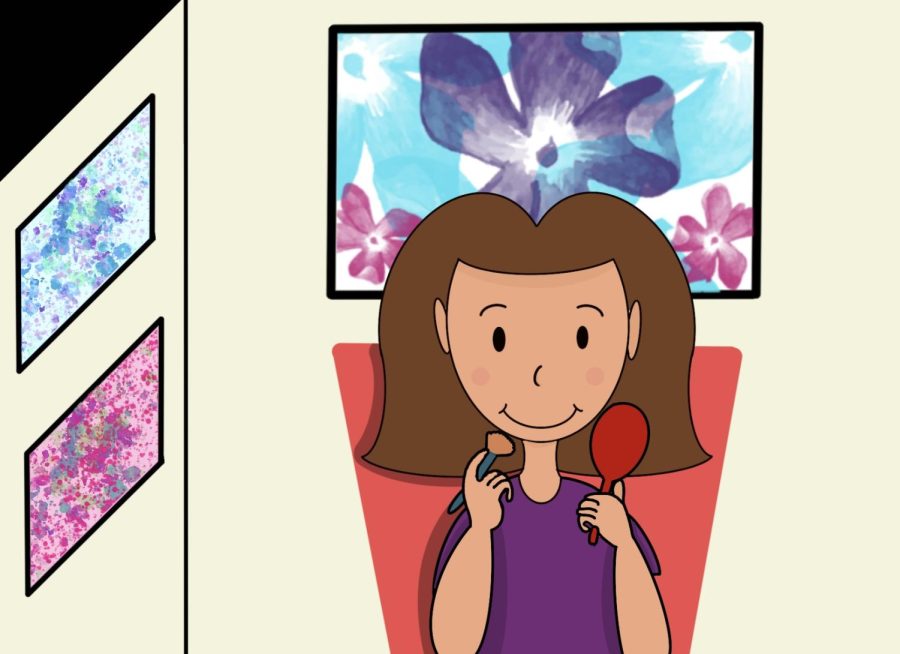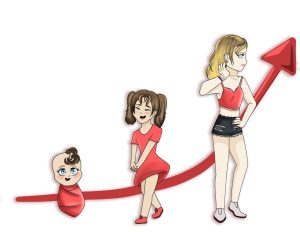[Opinion] Kids should focus on enjoying their childhood rather than rushing towards adulthood
Kids should enjoy their youth instead of rushing to be adults.
January 19, 2022
With layers of makeup, revealing clothing and an iPhone in hand, it has become a near impossible task to differentiate children as young as eight or nine years old from teenagers; they dress, act and look way older than they actually are.
For many children, the “traditional” childhood my peers and I enjoyed has been altered. Instead of playing outside for hours on end and not caring about how we looked, kids these days are fixated on growing up as quickly as possible. They swap playing outside for watching TikTok and choose outfits that are generally meant for an older audience. It seems like the moment children start middle school, they also transform into a teenager seemingly overnight.
“Eight is the new 13,” Bill Goodwin, a marketing consultant who specializes in children, wrote in the latest issue of Marketing Times.
Kids growing up at a rapid pace can be attributed to a semi-recent marketing trend called KGOY, an acronym for ‘Kids Getting Older Younger.’ KGOY describes younger children wanting to emulate maturity or appear older, causing them to adopt the same media or type of products that an older audience typically uses or consumes.
KGOY is a profitable phenomenon for marketers and children. By depicting older children as ‘cool,’ many advertisements attempt to convince kids that in order to be ‘cool,’ they must dress like, talk like and use products that older people use. KGOY also makes kids grow out of their toys, fashion and diet preferences more quickly.
Socially, it means that kids are getting more sophisticated in their choices about clothes and objects, and more mature and eager to grow up to upgrade to teenager status,thus blurring the lines of childhood.
According to a survey by Michael Tchong, eight out of 10 parents surveyed said peer pressure plays a role in the accelerated maturity of children. Once kids gain access to the internet, they share what they have learned with their peers. That process widens technology’s influential sphere while shrinking that of parents.
While waiting in line at various teenager stores at the mall, it is not uncommon to see a 9-year-old wearing a tube top and short shorts. This attire has become normalized for younger children. Our society has gotten to the point where this is no longer a sad phenomenon, it’s just what childhood is now–you leave elementary school and your life is an extended process of waiting to be a teenager.
Instead of asking for toys for the holidays, children beg for current trendy items that teenagers have, such as crop tops or an iPhone.
“In my unscientific survey of my children’s friends, the gift they most often said they wanted was a cell phone. A friend reports that her 9-year-old daughter refuses to use her Firefly cell phone — this is the kind that comes programmed with buttons for Mom and Dad–because it’s too humiliatingly babyish,” journalist Ruth Marcus said in a 2006 article posted on the Tampa Bay Times.
While there are many causes for the rush towards adulthood, the main one can be attributed to the expansion of technology in the past decades. If toddlers are playing computer games, how can 10-year-olds be expected to be content with building Legos or playing with dolls? The internet and television has only increased the constant exposure to commercialism, branding and evermore sophisticated cravings.
It is not an unusual concept to want to appear older, but when it gets in the way of enjoying childhood, it can become extremely harmful. It is saddening to see so many kids missing out on some of the best years of their lives due to wanting to grow up too fast.
Personally, I feel very lucky to have been given the chance to have a childhood where I was able to enjoy myself without a phone. I was not worried about what I looked like or what I was wearing, just that I was having a good time.
It is a valid question to ask if there will be a point in time where childhood is completely unrecognizable or if it will even exist. However, there are some steps that can be taken, specifically by parents, to offset the effect of KGOY and help their children get the most out of their childhood.
For one, parents should maintain free communication and listen to how their children feel on the issue. Growing up can be difficult for children who want to fit in with their peers. Secondly, parents can educate their children on the issue and help them understand what is happening and why. Ultimately, parents should encourage their child to pursue their own interests, rather than blindly following the steps of their peers.
Educating the next generation on this phenomena will ensure that our future generations will get the most out of their childhood years before rushing into adulthood.











